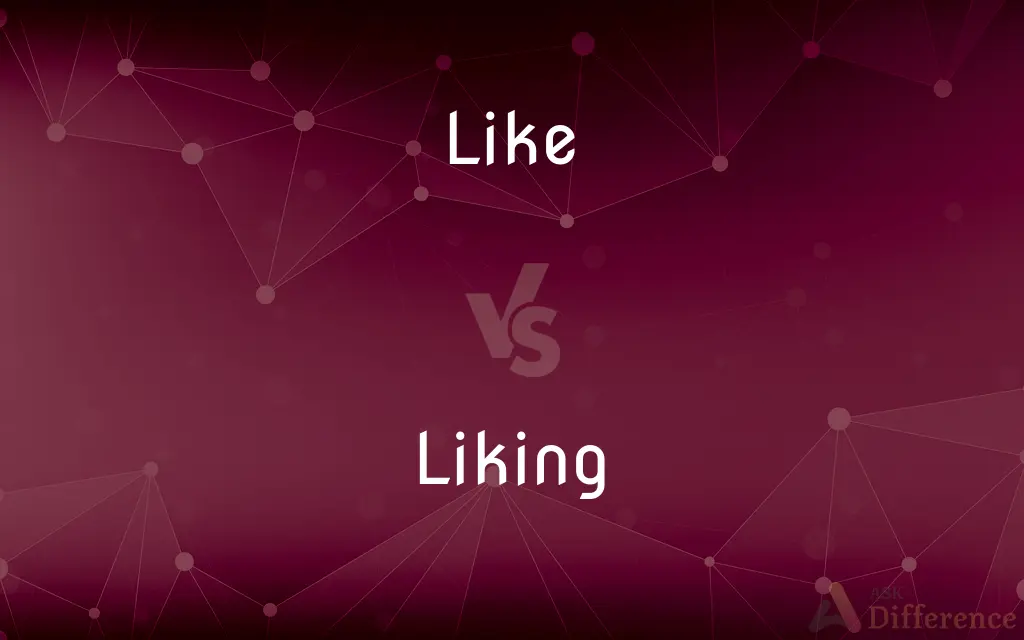Like vs. Liking — What's the Difference?

Difference Between Like and Liking
ADVERTISEMENT
Compare with Definitions
Like
(of a person or thing) having similar qualities or characteristics to another person or thing
I responded in like manner
The grouping of children of like ability together
Liking
Preference or taste
The climate here is not to my liking.
Like
In English, the word like has a very flexible range of uses, ranging from conventional to non-standard. It can be used as a noun, verb, adverb, adjective, preposition, particle, conjunction, hedge, filler, and quotative.
Liking
A feeling of attraction or love; fondness
The dog has taken a liking you.
Like
Having the same characteristics or qualities as; similar to
She looked nothing like Audrey Hepburn
He used to have a car like mine
They were like brothers
ADVERTISEMENT
Liking
Present participle of like
Like
Used to draw attention to the nature of an action or event
Why are you talking about me like that?
I apologize for coming over unannounced like this
Liking
A like; a predilection.
Like
Such as; for example
The cautionary vision of works like Animal Farm and 1984
Liking
(archaic) Approval.
Goods bought on liking
Like
In the same way that; as
People who change countries like they change clothes
Liking
Looking; appearing; as, better or worse liking. See Like, to look.
Why should he see your faces worse liking than the children which are of your sort?
Like
As though; as if
I felt like I'd been kicked by a camel
Liking
The state of being pleasing; a suiting. See On liking, below.
Like
Used with reference to a person or thing of the same kind as another
The quotations could be arranged to put like with like
I know him—him and his like
Liking
The state of being pleased with, or attracted toward, some thing or person; hence, inclination; desire; pleasure; preference; - often with for, formerly with to; as, it is an amusement I have no liking for.
If the human intellect hath once taken a liking to any doctrine, . . . it draws everything else into harmony with that doctrine, and to its support.
Like
The things one likes or prefers
A wide variety of likes, dislikes, tastes, and income levels
Liking
Appearance; look; figure; state of body as to health or condition.
I shall think the worse of fat men, as long as I have an eye to make difference of men's liking.
Their young ones are in good liking.
Would he be the degenerate scion of that royal line . . . to be a king on liking and on sufferance?
Like
Used in speech as a meaningless filler or to signify the speaker's uncertainty about an expression just used
There was this funny smell—sort of dusty like
Liking
A feeling of pleasure and enjoyment;
I've always had a liking for reading
She developed a liking for gin
Like
Used to convey a person's reported attitude or feelings in the form of direct speech (whether or not representing an actual quotation)
So she comes into the room and she's like ‘Where is everybody?’
Like
In the manner of
Like as a ship with dreadful storm long tossed
Like
Find agreeable, enjoyable, or satisfactory
People who don't like reading books
All his classmates liked him
I like to be the centre of attention
Like
Wish for; want
I'd like to hire a car
Would you like a cup of coffee?
I'd like you to stay
Like
To find pleasant or attractive; enjoy
Do you like ice cream? I like your style.
Like
To want to have
I would like some coffee.
Like
To prefer
How would you like your coffee—with sugar or without?.
Like
To feel about; regard
How do you like these new theater seats?.
Like
To believe or predict that (a certain competitor) will win a contest
Which team do you like in tonight's game?.
Like
To perform well under (a given condition) or using (a given feature)
This car does not like cold weather. The engine does not like enriched fuel.
Like
(Archaic) To be pleasing to.
Like
To have an inclination or a preference
If you like, we can meet you there.
Like
(Scots) To be pleased.
Like
Something that is liked; a preference
Made a list of his likes and dislikes.
Like
One similar to or like another. Used with the
Was subject to coughs, asthma, and the like.
Like
Often likes(Informal) An equivalent or similar person or thing; an equal or match
I've never seen the likes of this before. We'll never see his like again.
Like
Possessing the characteristics of; resembling closely; similar to
Your house is like mine.
Like
In the typical manner of
It's not like you to take offense.
Like
In the same way as
Lived like royalty.
Like
Inclined or disposed to
Felt like running away.
Like
As if the probability exists for
Looks like a bad year for farmers.
Like
Such as; for example
Saved things like old newspapers and pieces of string.
Like
Possessing the same or almost the same characteristics; similar
On this and like occasions.
Like
In the manner of being; as if. Used as an intensifier of action
Worked like hell.
Ran like crazy.
Like
(Informal) Probably; likely
Like as not she'll change her mind.
Like
Nearly; approximately
The price is more like 1,000 dollars.
Like
(Nonstandard) Used to provide emphasis or to focus attention on something
Let's like talk about this for a minute. It's like so crowded you can't move.
Like
In the same way that; as
To dance like she does requires great discipline.
Like
As if
It looks like we'll finish on time.
Like
To enjoy, be pleased by; favor; be in favor of.
I like hamburgers.
I like skiing in winter.
I like the Seattle Mariners this season.
Like
To please.
Like
(obsolete) To derive pleasure of, by or with someone or something.
Like
To prefer and maintain (an action) as a regular habit or activity.
I like to go to the dentist every six months.
She likes to keep herself physically fit.
We like to keep one around the office just in case.
Like
(obsolete) To have an appearance or expression; to look; to seem to be (in a specified condition).
Like
(archaic) To come near; to avoid with difficulty; to escape narrowly.
He liked to have been too late.
Like
To find attractive; to prefer the company of; to have mild romantic feelings for.
I really like Sandra but don't know how to tell her.
Like
(obsolete) To liken; to compare.
Like
To show support for, or approval of, something posted on the Internet by marking it with a vote.
I liked my friend's last status on Facebook.
I can't stand Bloggs' tomato ketchup, but I liked it on Facebook so I could enter a competition.
Like
(with 'would' and in certain other phrases) To want, desire. See also would like.
Would you like a cigarette?
We could go to the museum if you like.
I don't like to disturb him when he's working.
Like
To accept as an input.
We were frustrated that our seeming innocent choice for a team name was rejected by the censor. Apparently somewhere in the name is a word that the censor doesn’t like.
Like
To be likely.
Like
Something that a person likes (prefers).
Tell me your likes and dislikes.
Like
(internet) An individual vote showing support for, approval of, or enjoyment of, something posted on the Internet.
Like
(sometimes as the likes of) Someone similar to a given person, or something similar to a given object; a comparative; a type; a sort.
There were bowls full of sweets, chocolates and the like.
It was something the likes of which I had never seen before.
Like
(golf) The stroke that equalizes the number of strokes played by the opposing player or side.
To play the like
Like
Similar.
My partner and I have like minds.
The two cats were as like as though they had come from the same litter.
Like
Likely; probable.
Like
Inclined (to), prone (to).
He seems like to run from any semblance of hard work.
Like
Likely.
Like
In a like or similar manner.
Like
(colloquial) As, the way.
Like
As if; as though.
It looks like you've finished the project.
It seemed like you didn't care.
Like
Similar to, reminiscent of
Like
Typical of
It would be just like Achilles to be sulking in his tent.
Like
Approximating
Popcorn costs something like $10 dollars at the movies.
Like
In the manner of, similarly to
He doesn't act like a president.
Like
Such as
It's for websites like Wikipedia.
Like
As if there would be
It looks like a hot summer in Europe.
Like
Used to ask for a description or opinion of someone or something
I hear she has a new boyfriend. What's he like?
What's the weather like in Ürümqi today?
Like
Having the same, or nearly the same, appearance, qualities, or characteristics; resembling; similar to; similar; alike; - often with in and the particulars of the resemblance; as, they are like each other in features, complexion, and many traits of character.
'T is as like youAs cherry is to cherry.
Like master, like man.
He giveth snow like wool; he scattereth the hoar-frost like ashes.
Like
Equal, or nearly equal; as, fields of like extent.
More clergymen were impoverished by the late war than ever in the like space before.
Like
Having probability; affording probability; probable; likely.
But it is like the jolly world about us will scoff at the paradox of these practices.
Many were not easy to be governed, nor like to conform themselves to strict rules.
Like
Inclined toward; disposed to; as, to feel like taking a walk.
Had like to have been my utter overthrow.
Ramona had like to have said the literal truth, . . . but recollected herself in time.
Like
That which is equal or similar to another; the counterpart; an exact resemblance; a copy.
He was a man, take him for all in all,I shall not look upon his like again.
Like
A liking; a preference; inclination; - usually in pl.; as, we all have likes and dislikes.
Like
The stroke which equalizes the number of strokes played by the opposing player or side; as, to play the like.
Like
In a manner like that of; in a manner similar to; as, do not act like him.
He maketh them to stagger like a drunken man.
Like
In a like or similar manner.
Like as a father pitieth his children, so the Lord pitieth them that fear him.
Like
Likely; probably.
Like
To suit; to please; to be agreeable to.
Cornwall him liked best, therefore he chose there.
I willingly confess that it likes me much better when I find virtue in a fair lodging than when I am bound to seek it in an ill-favored creature.
Like
To be pleased with in a moderate degree; to approve; to take satisfaction in; to enjoy.
He proceeded from looking to liking, and from liking to loving.
Like
To liken; to compare.
Like me to the peasant boys of France.
Like
To be pleased; to choose.
He may either go or stay, as he best likes.
Like
To have an appearance or expression; to look; to seem to be (in a specified condition).
You like well, and bear your years very well.
Like
Prefer or wish to do something;
Do you care to try this dish?
Would you like to come along to the movies?
Like
Find enjoyable or agreeable;
I like jogging
She likes to read Russian novels
Like
Be fond of;
I like my nephews
Like
Feel about or towards; consider, evaluate, or regard;
How did you like the President's speech last night?
Like
Want to have;
I'd like a beer now!
Like
Resembling or similar; having the same or some of the same characteristics; often used in combination;
Suits of like design
A limited circle of like minds
Members of the cat family have like dispositions
As like as two peas in a pod
Doglike devotion
A dreamlike quality
Like
Equal in amount or value;
Like amounts
Equivalent amounts
The same amount
Gave one six blows and the other a like number
An equal number
The same number
Like
Having the same or similar characteristics;
All politicians are alike
They looked utterly alike
Friends are generaly alike in background and taste
Like
Conforming in every respect;
Boxes with corresponding dimensions
The like period of the preceding year
Share Your Discovery

Previous Comparison
Racketeering vs. Racket
Next Comparison
Index vs. Scale














































